Text
to love unconditionally - january 27th 2024 at 15:00
you look me
in my blue eyes
and say the word ''pretendian''
just to see if i flinch
what you don’t know
is that i’ve spent my whole life
wondering if my ancestors are disappointed
that my braids bleach in the sun
but then i think about
those ancestors and
i consider that maybe they’d be proud
that i looked like their husbands or nieces or neighbours
whom they loved so dearly
and then i think about my children
and how i would want them to look just like their father
no matter what his ancestry might be
because that is the nature of the heart;
to try and find pieces of who we love
in everything that we see
#indigenous art#indigenous#métis art#anishinaabe#métis#mixed#native#indigenous heritage#anishinaabemowin#ndn#indigenous stories#indigenous writing#indigenous peoples#first nations#indigenous languages#two spirit#grandfather teachings#truth
4 notes
·
View notes
Text
Not really an academic source, but for some perspective on Indigenous views of Riel I definitely recommend Women of the Fur Trade by Frances Koncan. It is a brilliant and humourous exploration of the rebellion in the form of a play set around three women (one Ojibwe, one Métis, one British) and their differing views on the matter. It is a super accessible and funny read, and a good place to start understanding Indig/Métis takes on some of the events of that time (it's written with a lot of modern slang, but takes places during the rebellion. There's a very fluid sense of time in this work, as with most Indigenous storytelling). Again, not a historical account by any means, but very good nonetheless.
"My people will sleep for one hundred years, but when they awake, it will be the artists who give them their spirit back." - Louis Riel
#indigenous#anishinaabe#métis#mixed#native#indigenous heritage#anishinaabemowin#ndn#indigenous art#indigenous stories#Louis Riel#michif#indigenous writing
36 notes
·
View notes
Text
"Also noteworthy in this context is that the verb debwewidam (verb bimaadizi intransitive)* translates as "s/he is heard speaking or making vocal sounds at a distance." When you break down the stem of this verb, you get deb (enough, adequate, reach) and -wewid (s/he makes sounds). Now, since the Ojibwe word for drum is dewe'igan, which is -- as I understand it -- a contraction of a word that literally means "instrument that makes the circular (returning) sound of the heart," there is reason to believe that there is a direct correlation between our sacred drum that sits at the heart of our culture, sound-making, and truth-speaking. Debwe-ode'-wewe-igan: speaks truth-her/his heart-sound-instrument." - zhaawano
This is what makes Anishinaabemowin so interesting and beautiful. Check out the full post!
The Way of the Heartbeat, Part 7: The True Meaning of the Word Debwewin
#indigenous#anishinaabe#métis#mixed#native#indigenous heritage#anishinaabemowin#ndn#indigenous art#indigenous stories#indigenous writing#indigenous peoples#first nations#indigenous languages#two spirit#grandfather teachings#truth
3 notes
·
View notes
Text

credit - unknown
#indigenous#anishinaabe#métis#mixed#native#indigenous heritage#anishinaabemowin#ndn#indigenous art#indigenous stories#resilience#indigenous resistance#two spirit
4 notes
·
View notes
Text
leave it behind - april 1st 2023 @ 12:43
not isolated
but completely uninhibited
not separated
just living like the ancestors did
walk around without shoes
feel closer to the land
lean over the side of the boat
let the water flow through your hand
gather together
laugh and cry around a fire
every day wake up with the sun
and at night hit the pillow tired
get yourself back to the land
if you want to feel alive
go to where the sun meets the sand
and leave the rest behind
-a girl in a chevy- she’s still sleeping
3 notes
·
View notes
Text
A large part of Anishinaabe territory is in Ontario, but Anishinaabemowin goes further than that! It’s definitely difficult to feel disconnected from, but a privilege to get to spend time learning now. It is an amazing language, with many interconnecting word roots that make it really fun to learn, and a bit easier to pick up on. Anishinaabemowin as a language is directly tied to our peoples’ connection with the land, and our stories show that. Language absolutely cultivates a sense of pride and belonging within community. I’m francophone as well, so the relationship to having had language rights stripped away and reclaiming language for cultural revitalization and language resurgence as a means of resistance is very real. Some off-reserve schools are starting to incorporate language into curriculum, and I plan on being one of the teachers that helps us get there. (For more information about the 20th century French education ban in Ontario, look into Rule 17. My school was named after Jeanne-Lajoie! To learn more about Indigenous linguocide, I recommend the poems ‘‘I Lost My Talk’’ by M’ikmaw Elder Rita Joe, ‘‘I’m Finding My Talk’’ by Rebecca Johnson, and their books of the same names. Residential schools and the 60s scoop certainly perpetuated this colonial violence tactic, so learn more about those to really understand what is going on with Indigenous language revival now). You will never catch me perpetuating language insecurity, because language is a part of someone’s connection to their identity, and it is not my place to tell them if I think they’re doing it right. For a long time, I suffered from language insecurity, unfortunately caused by other language speakers. Now, I make extra sure to introduce myself in Anishinaabemowin when going around the circle. It is a source of pride, and I hope my ancestors can hear me. If anyone feels like speaking privately on the matter, my inbox is a safe space.
Indigenous Tumblr, please interact!
TW: genocide and linguocide in America
I'm a linguistic enthusiast and non-American. I love how diverse the USA & Canada are - thousands and thousands of indigenous languages and they all are unique and so different from any language I've ever seen and heard. But all of them are endangered because the colonizers were erasing them with their speakers. Yet some indigenous languages are still spoken today. I love learning about these languages, but it feels like a colonists approach to learn about an indigenous language without learning its role in its community.
Dear indigenous people of Americas, where your languages are used today? What's their status in society? How do you feel about (not) knowing them? Is it a symbol of pride, resistance, and being part of your community or something that died long time ago? Do kids learn it in school?
If you feel uncomfortable with sharing your experience, it's fine to keep scrolling)
#writblr#indigenous writers#indigenous heritage#indigenous stories#indigenous#native#language revitalization#language#resistance#ndn tumblr#anishinaabemowin#anishinaabe#métis#mixed#residential schools#60s scoop#french#francophonie#ontario
47 notes
·
View notes
Text
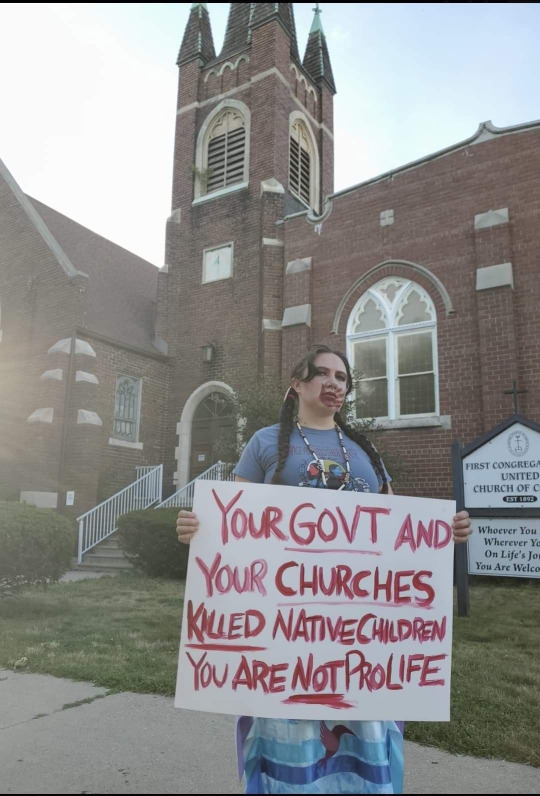
YOUR GOVERNMENT AND YOUR CHURCHES KILLED NATIVE CHILDREN
YOU ARE NOT PRO LIFE
#icwa#every child matters#protect native children#native american#indigenous#protect icwa#ndn#anishinaabe#residential schools#colonization#settler colonialism#settler violence#métis#decolonize education
3K notes
·
View notes
Text
Something new for Native American Heritage Month this year:
This playlist features indigenous musicians from North, Central, and South America. It includes a variety of genres (post-classical composers, folk punk, indie pop, pow wow punk rock (yes, that's a thing!), indie rock, etc.), as well as a variety of languages (Wolastoqey, Inuktitut, Atikamekw, Cherokee, Navajo, Cree, Quechua, Greenlandic (Kalaallisut), English, French, and Spanish).
#indigenous#music#native american#first nations#inuit#métis#native american heritage month#language revitalization#anishinaabe#mixed#indigenous enough#native music#culture
64 notes
·
View notes
Text
A'ho. Never forget you're living on turtle island.

Native land in native hands
#land back#indigenous issues#anishinaabe#métis#algonquin#indigenous#native#turtle island#colonization
1K notes
·
View notes
Text
losing my religion
i say oh my god
but who is my god
when i've nothing left
to believe in
when i get down
on my knees
i smell frankincense
and homelie
at what point
did they steal our fire
to light their vigils
and votives
my church keeps its pews
in a circle
we are cleansed by the smoke
and the precious water is for drinking
wearing white
only attracts filth
to those of us
really living
all of this i know
and yet my hands only remember
how to rest
in a prayer
#indigenous#métis#anishinaabe#mixed#religion#catholicism#atheism#theology#spirituality#religious trauma#native artist#indigenous artist#poetry#holy
9 notes
·
View notes
Text
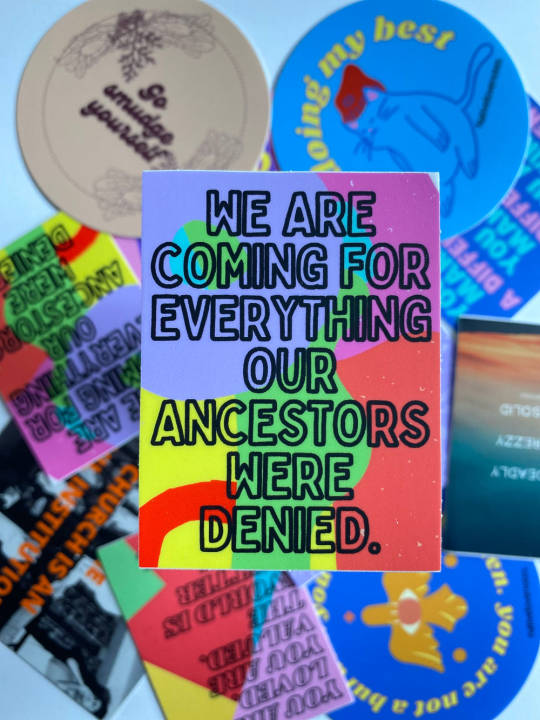
Sticker from nativelovenotes
#ndn#indigenous#icwa#anishinaabe#métis art#indigenous art#native art#landback#decolonisation#reconnecting#cultural resurgence
520 notes
·
View notes
Text

Lmaoooooo (true)
#indigenous#indigenous heritage#métis#native#anishinaabe#anishinaabemowin#mixed#ndn#n8tive#n8vgirls#native women#spirutality#dreaming
6 notes
·
View notes
Text
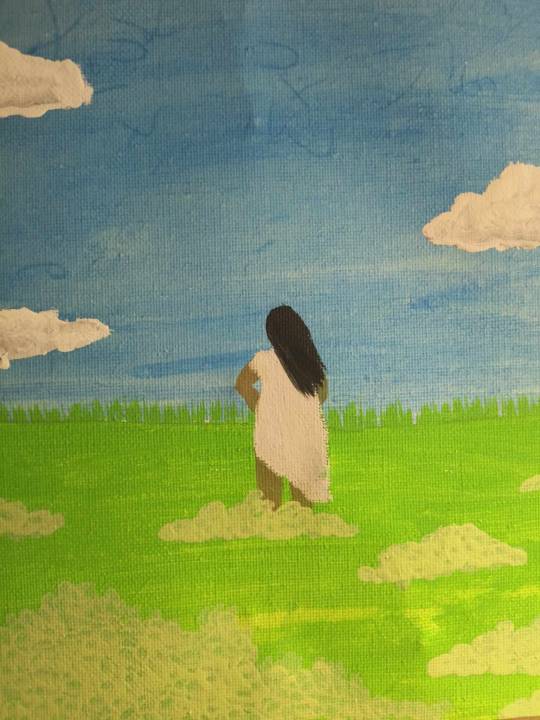
''Belonging'' by Halle Ward
mizhishawabi: [s]he sits out in the open
naawashkosiw: in the middle of a meadow
#indigenous heritage#indigenous#anishinaabe#métis art#mixed#native#native artist#indigenous art#painting#anishinaabemowin#ojibwe#indigenous languages
5 notes
·
View notes
Text
Being two-spirited is about so much more than your gender or sexuality. It is a part of your role here in this life. To me, at least, being two-spirit is about responsibility.
#indigenous#two spirit#queer#queer indigenous#2slgbtqia+#queer community#anishinaabe#indigenous issues#indigenous art#indigenous writing#first nations#métis#nonbinary#indigiqueer
44 notes
·
View notes
Text
Remember Your Asemaa
There was once a boy. He lived by a creek with his grandmother. In the early evenings, he would go out before the sun set to look for things.
His grandmother had a gift. She was a maker, and she always transformed anything he brought home to her into something magical.
His grandmother taught him from very young the importance of laying your asemaa down as an offering, to say miigwetch for what you are taking from the land.
One time, the boy went out looking, offered his tobacco, and brought home a big partridge miigwan. He gave the feather to ookomisan, and she made a beautiful dreamcatcher to hang above his bed by the window.
Another time, he found a nice birch tree. He put down some asemaa and began peeling the bark. When he got home, his grandmother spent the whole weekend weaving a strong basket so they could pick more miinan.
This time, though, the boy went out and found a short, smooth piece of driftwood. As he was examining it, something else down by the water caught his eye. A small, rounded rock with a hole in the center. The boy, now excited, took the piece of wood and the rock back with him in a hurry as the sun was beginning to set.
The next morning, his grandmother admired the piece of wood he brought back before deciding what it would become. She began working and the boy sat in the corner playing with the small rock he found. He looked up, and saw a transformation take place before his very eyes. His grandmother tossed the whittled bits from her lap into the fireplace and came over to the boy with mitigo-jiimaan. He took it from her and they headed outside to the creek to test it out.

He placed it down onto the water. It worked! It could float! The boy jumped up and hugged his grandmother to thank her. The boy stayed outside awhile to play with his little wooden canoe.
The next morning, the boy's grandmother was upset. She explained that when she woke up she found the small canoe she had worked so hard making had been broken in half.
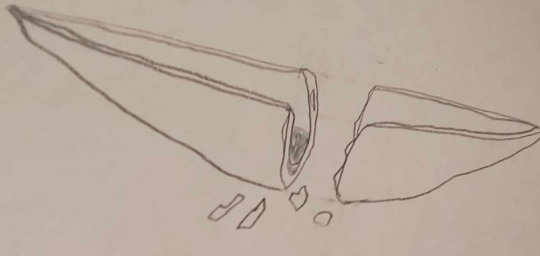
The boy begged his grandmother to believe that he would never break it. She thought for a moment, and asked him to calmly explain what happened the day before. When he was done, his grandmother instantly knew what had gone wrong. He had forgotten to offer tobacco. She sent the boy out with some asemaa in one half of the broken canoe, and some maple taffy in the other to offer up to memegwesiwag. She told him that the little people would accept his apology if he made sure to always offer his tobacco.
Early the next morning, the boy went to grab his special rock to take with him to go see what had happened to his canoe down by the creek. It was gone! The boy raced down to the water, hoping for some good news. His canoe wasn't there anymore, either!
The boy ran back home to his grandmother and started crying. She hugged him and told him to calm down, and that she would make him some cedar tea. The boy went to his corner by the fireplace, and couldn't believe his eyes. There was his now-fixed mitigo-jiimaan, complete with tiny, ornate carvings along where the crack had been. Inside the canoe, he found his rock turned into a necklace. His grandmother told him that he should wear it every day, to remind him to always remember his asemaa.
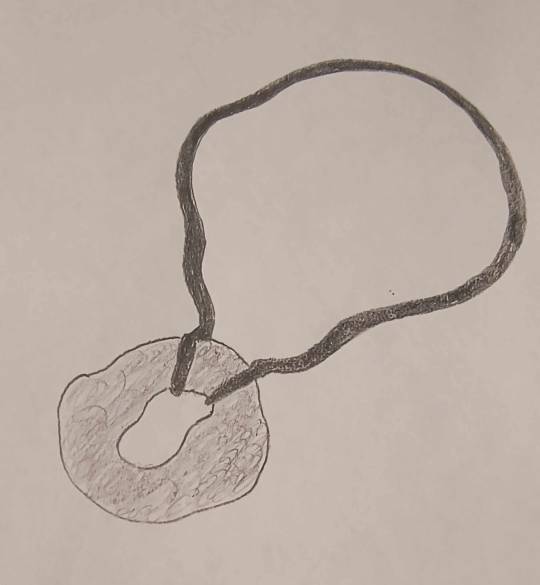
Chi-miigwech for reading and sharing my story.
asemaa: tobacco
miigwetch: thank you
miigwan: feather
ookomisan: [his] grandmother
miinan: blueberries
memegwesiwag: little people (dwarf spirits)
mitigo-jiimaan: wooden canoe
#writblr#indigenous#indigenous heritage#native#indigenous stories#short stories#métis#anishinaabe#anishinaabemowin#ndn#indigenous writers
25 notes
·
View notes
Text
Winter Writing Goal
The snow looks like it's here to stay this time, which means storytelling season is upon us. I'm going to push myself gabe-biboon to use this time for such. I think my goal is short stories with a moral and a sprinkle of anishinaabemowin. Something hopefully good and accesible to kids and reconnecting adults alike.
gabe-biboon: all winter
anishinaabemowin: the language
#writblr#indigenous#native#ndn#anishinaabe#anishinaabemowin#métis#mixed#short stories#reconnecting#indigenous heritage#language revitalization#reclamation
1 note
·
View note
Text
"My people will sleep for one hundred years, but when they awake, it will be the artists who give them their spirit back." - Louis Riel
#indigenous#indigenous artist#indigenous heritage#native#native artist#native art#metis#métis#métis art#louis riel#mixed
36 notes
·
View notes